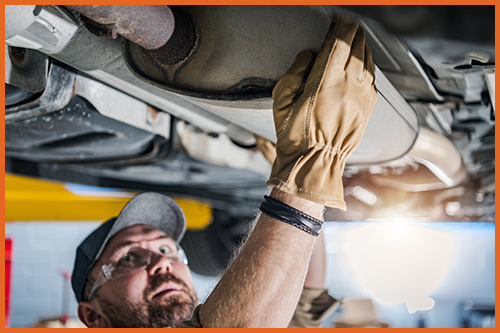What Does A Catalytic Converter Do?
A catalytic converter is a mandatory component of a vehicle that takes toxic gasses and pollutants produced by the internal combustion engine and converts them to less toxic emissions.
As a result, fewer toxins are emitted into the atmosphere once the emissions exit the exhaust pipe.
All gas, diesel, and hybrid vehicles are engineered with a catalytic converter. It not only helps to reduce the amounts of pollutants in the atmosphere but it also helps your engine run more efficiently by removing heat and pressure.
A catalytic converter is vital to your car’s wellbeing and driving without one is not in your best interest. But, what should you do if it’s broken?
Bad Catalytic Converter Symptoms
There are a few telltale signs that your catalytic converter is going bad:
Engine Stalling — A malfunctioning catalytic converter can cause your engine to stall and your car not to start. The clogged converter can’t expel exhaust gasses, causing them to build up in the engine and force a stalling due to the increased pressure.
Reduced Acceleration Power — A clogged catalytic converter can cause your car to lose power when accelerating. This symptom is especially noticeable when going uphill.
Overheating/Smoke — The buildup of gasses within your engine caused by a bad catalytic converter can cause it to overheat. An overheating engine can produce smoke as some liquid components (like oil) reach their boiling point.
Reduced Fuel Efficiency — If you notice your gas mileage isn’t as great as it used to be, your catalytic converter may be defective. If you happen to take and fail an emissions test, then you can almost guarantee a faulty converter is an issue.
What Causes Catalytic Converters To Fail?
Catalytic converters don’t just fail on their own and are often indicators of a much larger problem within your vehicle’s system.
The majority of catalytic converter failures exist within three categories:
Overheated, Melted, or Broken Converters
Coated/Oil-Fouled Substrate
Structural Damage
Can You Drive With A Bad Catalytic Converter?
A catalytic converter isn’t completely necessary for a car to function. However, it does increase your car’s performance and efficiency.
That is because the emissions produced by your engine aren’t only harmful to human life and the environment; but also to your engine’s integrity.
Without the catalytic converter taking in the hot gasses from the engine, the built up heat can warp engine components and cause overheating, misfiring, lagging, and failure.
Not only is a catalytic converter better for your car, your state probably mandates that you have one. In many U.S. states, it’s illegal to operate a vehicle without a catalytic converter.
That’s due to vehicle emission limits established. Driving either without a catalytic converter or with a damaged one would have your vehicle exceeding those emission limits.
Moreover, the states that have emission laws in place require drivers to pass an emission test. If you fail this test, you won’t be legally permitted to operate your vehicle until you get your catalytic converter repaired and pass the test.
Our expert evaluators can help you get an accurate estimate for your cars value, FAST!

What Can You Do About A Bad Catalytic Converter?
Cost To Replace A Catalytic Converter
Catalytic converters replacement costs have an average ranging from $400-$3000, making them pretty expensive pieces for your car.
Adding in the cost of labor, other components, and repairs to damage around the site of the converter, you could look at paying over $1,000 to replace your converter on the low end.
How Much Is A Catalytic Converter Worth?
The reason they are so expensive is due to the roughly 4-9 grams of precious metals within the converter and the more efficient, low-emission vehicles tend to have more expensive metals within theirs.
Metals like rhodium, platinum, and palladium make the catalytic converter both an expensive part to replace and a prime target for thieves.
Catalytic Converter Theft
According to NPR and the National Insurance Crime Bureau, there has been a tenfold increase in catalytic converter thefts over the last several years.
In 2020 alone, there were more than 14,000 cat converters stolen from cars and trucks.
Catalytic converters aren’t just a lucrative steal, but they’re also quick and easy to remove.
Compared to stealing an engine, transmission, or an entire vehicle, the converters take less effort to detach and transport, while yielding a hefty payout.
3 Signs Of A Stolen Catalytic Converter
Abnormally Loud Car
When your catalytic converter is stolen, your car will sound less like a sedan and more like a jet. The shift in sound is jarring enough that you’ll likely take notice and inspect your vehicle.
Check Engine Light
Your vehicle’s engine control unit monitors a host of sensors within your engine bay. This mechanism allows the ECU to control the ratio of the car’s air to fuel mixture and emission control systems.
A full drive cycle allows the ECU to run its tests, identify an issue, and activate the check engine light if your catalytic converter is missing.
Carbon Monoxide Poisoning
While we typically associate carbon monoxide poisoning with operating vehicles inside closed spaces, there are recorded instances of death and illness from carbon monoxide happening while a vehicle is stranded or because of a compromised exhaust system.
Catalytic converters reduce the amount of carbon monoxide produced by your vehicle by 95%. If your converter is malfunctioning or stolen, the level of carbon monoxide exposure increases nearly 20 times its normal levels.
These fumes can reach your vehicle cabin and instigate headaches, delayed reaction time, and confusion. Even without displaying any symptoms, people still fall victim to carbon monoxide poisoning!
Who Buys Cars With Bad Catalytic Converters?
DamagedCars specializes in buying cars that have seen better days and your vehicle with the bad catalytic converter is no exception. Regardless of the reason your car is burning oil, we make the process of selling it as easy as 1-2-3:
Step 1: Get a quote! All you have to do is enter a bit of information about your car on our website, and you'll get a free and guaranteed quote in 90 seconds! Towing is ALWAYS included.
Step 2: Schedule your pickup at a time that works for you! We can come in as little as 24-48 hours after you accept the offer, so you don't have to wait to complete the sale.
Step 3: Collect your check! Just wait for the tow truck driver to arrive. Hand over the keys, sign over the title and collect your payment for your car! No haggling, no fuss.
You'll get an offer from us with no pressure to sell from us, and we can answer any questions you may have about your cars.
All we need is your ID and proof of ownership to pick up your car. And remember to check your local laws regarding license plates before we buy your car with a bad catalytic converter — if they stay with the seller, remove them!



